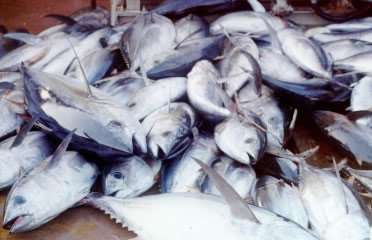Eighty tons of illegal bluefin tuna pose a threat to sustainable fisheries and human health

Spanish authorities announced the arrest of 76 people involved in a large illegal trade of bluefin tuna worth over €12 million per year between Malta and Spain, and with the engagement of other EU countries. 80,000 kg of illegally caught and marketed tuna were seized in the investigation, led under the coordination of EUROPOL. Irregularities found in the handling of the fish could also cause food poisoning.
The international investigation has discovered a large network of fishing companies and distributors that includes one of Europe's biggest seafood farming companies, the Ricardo Fuentes and Sons Group, based in Spain.
The investigation provides crucial information ahead of the meeting of the International Commission for the Conservation of Atlantic Tunas (ICCAT) taking place from 12 to 19 November in Croatia and where fishing nations and the EU will agree on new measures to manage the lucrative fishery of the east Atlantic and Mediterranean bluefin tuna.
Commenting on the case, Alessandro Buzzi, Bluefin Tuna Regional Manager with WWF, said:
"It's simply unacceptable that such a massive trade of illegal bluefin tuna involving European companies and worth millions of euros has managed to escape the controls of governments and most especially the EU institutions. Bluefin is one of the most economically valuable fish on the planet, therefore we need stronger rules and better monitoring to effectively protect the stock. Fishing nations and the EU should take into account these unreported catches before moving forward with the planned increase of fishing quotas and any change is made to the recovery plan currently in place. We cannot let the bluefin stock crash once more."
According to the investigation, Malta was one of the main sources of the illegal tuna that was sold and traded together with legal quantities. Here about 2.5 million kilos of undeclared tuna are estimated to be sold for a total profit of €12.5 million per year. Italy was the starting point of another route: all the products came from illegal catches and were transported to Spain by road without any type of documentation and without any system of traceability and distributed to smaller businesses in the sector. French ports were used for transferring the illegal goods from Italy to Malta.
The investigation also reported several health and hygiene irregularities regarding the conservation of the fish after being caught, that could have caused food poisoning among consumers.
"All illegal seafood that reaches our plate has escaped the traceability and hygiene controls that are so important to protect our health. Tackling illegal fishing is important to protect our ocean as well as our own health." concluded Buzzi.
Provided by WWF




















